新视野大学英语第三版第一册Unit 7教案
- 格式:docx
- 大小:20.43 KB
- 文档页数:5
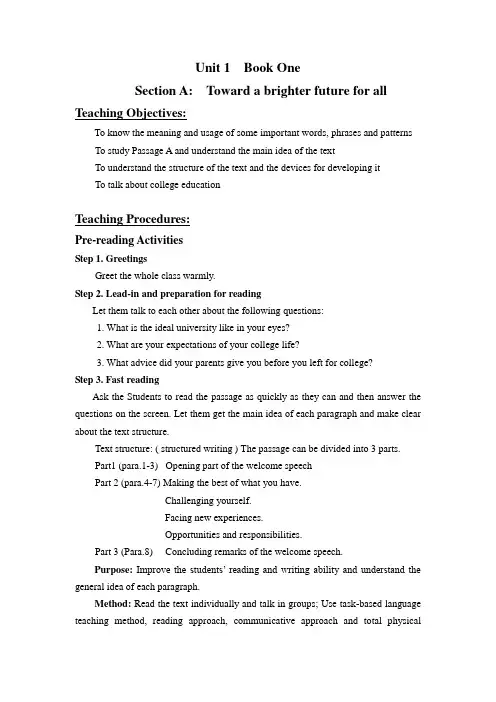
Unit 1 Book OneSection A: Toward a brighter future for all Teaching Objectives:To know the meaning and usage of some important words, phrases and patterns To study Passage A and understand the main idea of the textTo understand the structure of the text and the devices for developing itTo talk about college educationTeaching Procedures:Pre-reading ActivitiesStep 1. GreetingsGreet the whole class warmly.Step 2. Lead-in and preparation for readingLet them talk to each other about the following questions:1. What is the ideal university like in your eyes?2. What are your expectations of your college life?3. What advice did your parents give you before you left for college?Step 3. Fast readingAsk the Students to read the passage as quickly as they can and then answer the questions on the screen. Let them get the main idea of each paragraph and make clear about the text structure.Text structure: ( structured writing ) The passage can be divided into 3 parts.Part1 (para.1-3) Opening part of the welcome speechPart 2 (para.4-7) Making the best of what you have.Challenging yourself.Facing new experiences.Opportunities and responsibilities.Part 3 (Para.8) Concluding remarks of the welcome speech.Purpose: Improve the students’ reading and writing ability and understand the general idea of each paragraph.Method: Read the text individually and talk in groups; Use task-based language teaching method, reading approach, communicative approach and total physicalresponse method.Step 4. Preparation for details of the text on the screenStudents are required to look at the Words and Phrases on the screen and give a brief presentation in class.Words and Phrases:Purpose: Train the Students’ ability of unde rstanding and using foreign language.Method:Talk in groups, Use task-based language teaching method, communicative approach and total physical response method.1. (Para.1)pledge to do sth. 作保证,承诺China and the United states pledge to boost cooperation and exchange to ensure a better future for China-US ties.中美政府承诺将加强合作与交流以确保两国关系的未来更加美好。
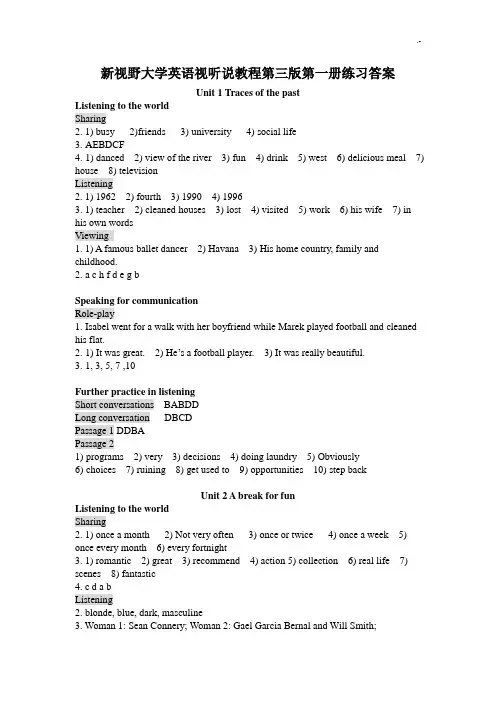
新视野大学英语视听说教程第三版第一册练习答案Unit 1 Traces of the pastListening to the worldSharing2. 1) busy 2)friends 3) university 4) social life3.AEBDCF4.1) danced 2) view of the river 3) fun 4) drink 5) west 6) delicious meal 7) house 8) televisionListening2. 1) 1962 2) fourth 3) 1990 4) 19963. 1) teacher 2) cleaned houses 3) lost 4) visited 5) work 6) his wife 7) in his own wordsViewing1. 1) A famous ballet dancer 2) Havana 3) His home country, family and childhood.2.a c h f d e g bSpeaking for communicationRole-play1.Isabel went for a walk with her boyfriend while Marek played football and cleaned his flat.2.1) It was great. 2) He’s a football player. 3) It was really beautiful.3.1, 3, 5, 7 ,10Further practice in listeningShort conversations BABDDLong conversation DBCDPassage 1 DDBAPassage 21)programs 2) very 3) decisions 4) doing laundry 5) Obviously6)choices 7) ruining 8) get used to 9) opportunities 10) step backUnit 2 A break for funListening to the worldSharing2. 1) once a month 2) Not very often 3) once or twice 4) once a week 5) once every month 6) every fortnight3. 1) romantic 2) great 3) recommend 4) action 5) collection 6) real life 7) scenes 8) fantastic4. c d a bListening2. blonde, blue, dark, masculine3. Woman 1: Sean Connery; Woman 2: Gael Garcia Bernal and Will Smith;Man 1: Judi Dench; Man 2: Scarlett JohanssonViewing1.1) It is a music festival2)It is held in the Isle of Wight every September.3)I think people can enjoy the music at the festival and have fun with their families and friends.2. 2, 4, 63. 1) garden; baby and wife; 2) traditional values; like; 3) being together Speaking for communicationRole-play1.1)fell like 2) What do you recommend 3) how about 4) What’s it about5)Who’s in it 6) Do you think 7) Why don’t we2. 1, 4, 5, 7, 8, 9, 10Further practice in listeningShort conversations DBCADLong conversation DCBCPassage 1 ABACPassage 21) comic 2) traffic 3) constantly 4) available 5) took part in6) attracted 7) audience 8) free of charge 9) put forward 10) embraceUnit 3 Life momentsListening to the worldSharing2.1) because there’s so much to do2)He has been to lots of interesting places but there’s always something new to experience3) How do you feel about London?3. A C H B G F D E4. 1) exciting 2) amazing concert 3) incredible 4) the theater 5) the best place 6) different 7) compared to 8) play football 9) interesting things 10) the best thing 11) tickets 12) culture and sportListening2. a d h e b g c f3. 1) In Australia 2) Because he decided to go further after he realized he didn’t know where he was 3) Really frightened 4) Don’t move, and don’t look at the dogs 5) A treeViewing2. Francesco is an architect and historian. He visits the island of Crete and goes to a local wedding.3.2,44.1)Crete is the biggest island in Greece.2)She is a little nervous.3)All the women in the village are helping prepare the wedding feast.4)About 1500 people.5)They give money as gifts.6) There is so much to see, do and eat at the wedding. Francesco is overwhelmed by all that.Speaking for communicationRole-play2. 1) It’s 2) there 3) leave a message 4) call 5) speak 6) moment 7) ring 8) number 9) this 10) picking upFurther practice in listeningShort conversations CCBDALong conversation BCADPassage 1 CABCPassage 21) mountainous 2) frightened 3) took place 4) vanish 5) occurred6) massive 7) caught 8) keep us away from 9) grateful 10) in advanceUnit 4 Getting from A to BListening to the worldSharing2. A: bus B: car C: walking D: walking, the tube E: bus, walking F: bike3. 1) fresh air 2) avoid holes 3) think about 4) dream 5) looking out of the window 6) an accident4.E F A D B C5.B C A D F E6.1) by underground 2) go to school by bus 3) about an hour 4) listen to music 5) look out of the windowListening1. B C A5. 1) 1962 2) leave their cars at home 3) public transport 4) build 5) keep in good condition 6) 1948 7) got in and drove away 8) engineering problem 9) too heavy 10) strong 11) private 12) difficult to fly 13) traffic problem Viewing2. 1) queuing 2) making phone calls 3) pizza 4) playing outside 5) chess3.A: 3,5 B: 2 C: 1,6 D: 44.1) airport managers 2) relax 3) pass the time 4) midnight 5) their flight 6) 300 7) 319 8) 5005.1) Beijing 2) terrible 3) 7 p.m. 4) a computer problem in the control tower 5) cancelled 6) another flight 7) queue/wait 8) sleeping everywhere at the airport 9) took off 10) 3 o’clock this morningSpeaking for communicationRole-play1. 1) tied up; customer 2) 20; coffee 3) delayed; cow; stations2. 1) all right 2) mean 3) not acceptable 4) won’t 5) really 6) not my fault3. Acceptable: 3,4,6,7Further practice in listeningShort conversations CBDDALong conversation CBDDPassage 1 CADAPassage 21) Gradually 2) enabled 3) vehicles 4) dates back to 5) As a result6) thoroughly 7) capacity 8) turn 9) automobiles 10) thanks toUnit 5 Relax and exploreListening to the worldSharing2. adventure holidays, beach holidays, city breaks, activity holidays, swimming, skiing, relaxing holidays3. 1, 4, 5, 7, 104. 1) relaxing 2) fantastic 3) lovely 4) Amazing 5) thoroughly enjoyed 6)Lovely 7) fantasticListening3. 1) more comfortable 2) Plane 3) faster 4) In a hotel 5) more comfortable 6) In an apartment 7) more expensive 8) Go sightseeing 9) Go sightseeing 10) more interesting 11) In summer 12) better 13) hotter 14) hot weather 15) In spring 16) more crowded 17) Go to a restaurant 18) quieter 19) Go to a restaurant 20) quieter 21) more relaxing 22) A month 23) A monthViewing1. 1) La Boca 2) Football and polo 3) Argentinian beef2. c a f d e b3. 1) widest; cuts through 2) football; his career 3) famous; 1800s 4) apparently 5) 80 6) fantastic meat 7) vegetables 8) family and friends; wonderful moments Speaking for communicationRole-play1. 2,4,5,82. 1) Could I have 2) can we have 3) that 4) French 5) I’d like 6) The same Further practice in listeningShort conversations ADACCLong conversation DCDCPassage 1 DBACPassage 21) celebrate 2) provide us with 3) sticking to 4) challenges 5) anticipating6) portions 7) stuff 8) take hold of 9) effective 10) strategiesUnit 6 Wit and fitListening to the worldSharing2. 1) exercise 2) full-time 3) running3. 1, 54. D G A E B C F5. 1) a sweet tooth 2) sweet 3) coffee 4) chocolate 5) Eating late 6) regularly 7) too much 8) fast food 9) far too many 10) cakeListening3. 1) eating problems 2) replace normal food 3) eat only food pills 4) taste different 5) change its flavor 6) become common4. 2Viewing1.Play: basketball, badminton, rugby, cricket, volleyball, squash, football, tennisGo: surfing, horse racing, jogging, cycling, swimming, rollerblading, skiing2. Corbett finds it difficult to keep calm probably because he is beaten by Barker, who has never played squash before.3. C A C D D4. BBBCC BCBCCSpeaking for communicationRole-play1. d b f e a c2. 1) tea and coffee 2) one small cup 3) painkillers 4) three times a day 5) Foot pain 6) worry aboutFurther practice in listeningShort conversations CBDBDLong conversation CBAAPassage 1 BDBAPassage 21) pressures 2) disappear 3) compromise 4) alcohol 5) intense6) interferes with 7) undermine 8) pay attention to 9) suffers from 10) competitiveUnit 7 Weird, wild and wonderfulListening to the worldSharing2. 1, 3, 43. CAFDEB4. 1) Snakes 2) the end 3) hate 4) scared of 5) afraid of 6) horses 7) frighten 8) scares 9) memories 10) sharks 11) unknownListening3. 1) encir. probs. 2) ˃6 bil.3) 2050 4) ˃9 bil.5) popu. 6) probs4. 1) 3 2) probs. 3) water 4) < 5) 4.52L 6) 600 L 7) ˃8) diffi. 9) animals 10) ↑11) ↓12) Rainf. 13) 150,000 k㎡14) the weather 15) ↑ 16) ↑ 17) ↑Viewing2. 2, 33. CCAA4. 1) beautiful 2) magical 3) lovely 4) fantastic 5) happy 6) astonishing Speaking for communicationRole-play2.BAA3.e a c b d f gFurther practice in listeningShort conversations CABDDLong conversation DCDAPassage 1 CCACPassage 21) participated in 2) access 3) tremendous 4) currently 5) incredible6) accompany 7) remarkable 8) amazing 9) catching a glimpse of 10) looking forward toUnit 8 Money mattersListening to the worldSharing2. CEBADF3. BBABBA4. dress, book, handbad, trousers, trainers, shoes, coat, sunglasses, tops, skirts, telephoneListening1. CABD3. chewing gum, the mobile phone, the iPod and Monopoly5. 1, 4, 5, 6, 7Viewing2. 1) early 30s; 6 billion 2) computer science students 3) tour guide; in the group4) searching the Internet 5) 2000; successful business 6) fastest growing; most profitable3. 4,5Speaking for communicationRole-play1. CBABC2. SSCCS CSSCCFurther practice in listeningShort conversations BDCBDLong conversation BCADPassage 1 CDBDPassage 21) evidence 2) enhance 3) interviewed 4) rated 5) took into account6) forecast 7) emerged 8) was related to 9) adapt themselves to 10) original。
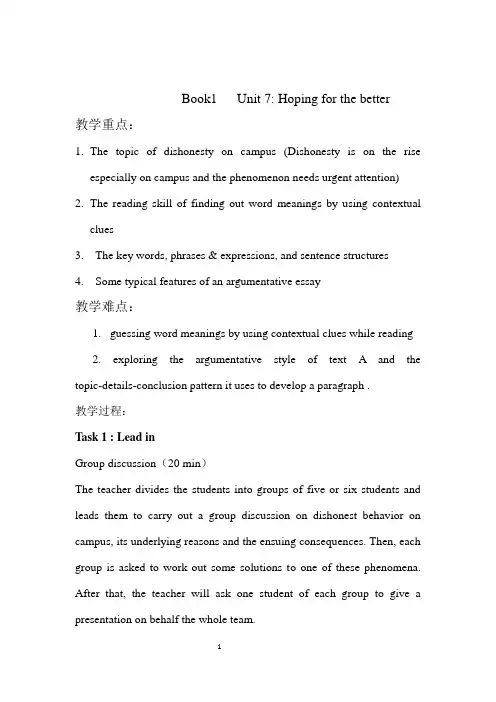
Book1 Unit 7: Hoping for the better教学重点:1.The topic of dishonesty on campus (Dishonesty is on the riseespecially on campus and the phenomenon needs urgent attention) 2.The reading skill of finding out word meanings by using contextualclues3. The key words, phrases & expressions, and sentence structures4. Some typical features of an argumentative essay教学难点:1.guessing word meanings by using contextual clues while reading2. exploring the argumentative style of text A and the topic-details-conclusion pattern it uses to develop a paragraph .教学过程:Task 1 : Lead inGroup discussion(20 min)The teacher divides the students into groups of five or six students and leads them to carry out a group discussion on dishonest behavior on campus, its underlying reasons and the ensuing consequences. Then, each group is asked to work out some solutions to one of these phenomena. After that, the teacher will ask one student of each group to give a presentation on behalf the whole team.Brain storming (15 min)Interacting with students by asking them to think of words about dishonesty as a way to lead in some important words.Pre-reading activities (page 176) (10 min)Task 2: Understanding the main idea of text A1. Skinning and scanning (15 min)Task 1: students are required to note nouns and adjectives concerning dishonesty in the article. Later, they will be asked to group these words into synonyms and antonyms.Task 2: students are also required to mark numbers that appear in the article and explain why they are used.2. Comprehension Qs (page 183) (15 min)Task 3 Stylistic analysis (15 min)Concerning the writing style, the students are guided to realize Text A is an argumentative essay. With regard to an argumentative essay, they should know the whole text centers on a topic and concerning the topic the writer definitely has his standpoint. Then concerning each part and each paragraph, the students are guided to discover that there generally is a topic sentence/statement supported by details (examples in particular in Text A) and a concluding sentence/statement.Task 4 Language points (45 min)2.Key words:eliminate reveal accurate facilitateexaggerate imply launch2.Paraphrasing some complex sentences (15 min)1. We have all read or heard accounts such as these, not to mention the stories of dishonesty amongst all layers of society as exemplified by consumers who steal and politicians who demand bribes. (Para.1)2. Some people worry that the Internet, once hailed as the ultimate learning tool, could become the best aid yet for cheating. (Para. 3)3. With awareness of increasing dishonesty in today’s society, it’s sometimes implied that in “the good old days” people were better, happier, and more honest. (Para. 5)4. Without trust, ordered societies would descend into chaos. (Para. 6) Part 6 Translation (15 min)1. Travelers ripped off so many towels last year that it cost a major hotel chain $3 million to replace them. Especially troubling are the reports that dishonesty is increasing amongst student populations around the world.2. Some people worry that the Internet, once hailed as the ultimate learning tool, could become the best aid yet for cheating.3. Whether discovered or not, dishonesty has an undesirable effect on anyone who practices it.Part 7: Structural analysis (10 min)Part 8 Summary (5 min)Part 8 Exercises & Structured writing (相关活动见附件) Assignment1. Do some critical thinking concerning the following topic:In some universities, students are asked to sign an Honesty Declaration in the exam. Do you think this is an effective way to prevent cheating? Why or why not?2. Collect some materials about dishonesty ant try to analyze the causesListening: Unit 4 Getting from A to B教学重点:1. talk about different types of transportation2. ask yourself information questions before listening教学难点:1. make and respond to apologies2. deal with problems when traveling教学过程:Opening-up1.Read the statements. Then underline the alternatives which are true foryou or fill in the blanks according to your own experiences.2.Work in pairs and compare your answers.Listening to the world1.Ask Ss to watch a podcast to get its general idea and discuss theiranswers in groups.2.Ask Ss to watch a podcast and fill in the blanks.3.Ask Ss to discuss the following questions based on what they haveheard.Questions:1 What was the transportation idea?2 Who invented it?3 What was the idea behind it?4 What was the problem with it?5 How successful was it?Role-playWork in pairs and role-play one of the following situations by using skills for Making and responding to apologiesSituation 1: When you interrupt or disturb someone:Situation 2: When yo u make a mistake in what you’re saying, or use the wrong word:Situation 3: When you have to leave someone for a short period of time:Situation 4: When you make a mistake in what you’re saying, or use the wrong word:Further practice in listeningShort conversationsLong conversationPassage 1Passage 1Assignment:Work in groups of three and choose one of the problems in Exercise 3. Discuss the following questions and fill in the table withkey words and expressions.。
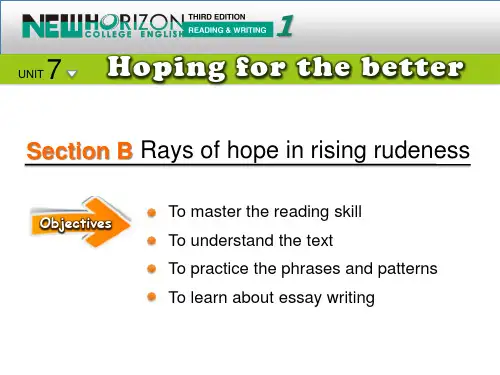
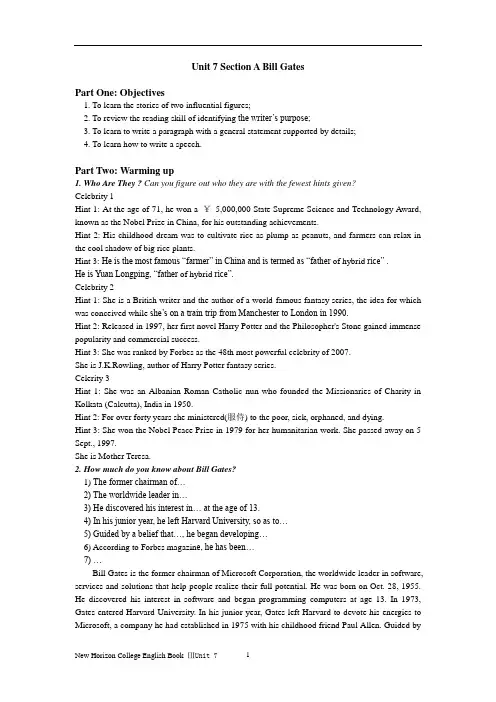
Unit 7 Section A Bill GatesPart One: Objectives1. To learn the stories of two influential figures;2. To review the reading skill of identifying the writer’s purpose;3. To learn to write a paragraph with a general statement supported by details;4. To learn how to write a speech.Part Two: Warming up1. Who Are They ? Can you figure out who they are with the fewest hints given?Celebrity 1Hint 1: At the age of 71, he won a ¥5,000,000 State Supreme Science and Technology Award, known as the Nobel Prize in China, for his outstanding achievements.Hint 2: His childhood dream was to cultivate rice as plump as peanuts, and farmers can relax in the cool shadow of big rice plants.Hint 3: He is the most famous “farmer” in China and is termed as “father of hybrid rice” .He is Yuan Longping, “father of hybrid rice”.Celebrity 2Hint 1: She is a British writer and the author of a world-famous fantasy series, the idea for which was conceived while she’s on a train trip from Manchester to London in 1990.Hint 2: Released in 1997, her first novel Harry Potter and the Philosopher's Stone gained immense popularity and commercial success.Hint 3: She was ranked by Forbes as the 48th most powerful celebrity of 2007.She is J.K.Rowling, author of Harry Potter fantasy series.Celerity 3Hint 1: She was an Albanian Roman Catholic nun who founded the Missionaries of Charity in Kolkata (Calcutta), India in 1950.Hint 2: For over forty years she ministered(服侍) to the poor, sick, orphaned, and dying.Hint 3: She won the Nobel Peace Prize in 1979 for her humanitarian work. She passed away on 5 Sept., 1997.She is Mother Teresa.2. How much do you know about Bill Gates?1) The former chairman of…2) The worldwide leader in…3) He discovered his interest in… at the age of 13.4) In his junior year, he left Harvard University, so as to…5) Guided by a belief that…, he began developing…6) According to Forbes magazin e, he has been…7) …Bill Gates is the former chairman of Microsoft Corporation, the worldwide leader in software, services and solutions that help people realize their full potential. He was born on Oct. 28, 1955. He discovered his interest in software and began programming computers at age 13. In 1973, Gates entered Harvard University. In his junior year, Gates left Harvard to devote his energies to Microsoft, a company he had established in 1975 with his childhood friend Paul Allen. Guided bya belief that the computer would be a valuable tool on every office desktop and in every home, they began developing software for personal computers. Under Gates' leadership, Microsoft's mission has been to continually advance and improve software technology, and to make it easier and more enjoyable for people to use computers. According to Forbes magazine, Gates has been the richest man in the world since 1995.3. What challenges did Bill Gates meet? And what do you think of that?1) The federal government claimed that …2) This case started when …3) Although Microsoft believed it’s logical, its competitors thought that …4) As far as the case is concerned, I think that …Our top story today is the case being brought against Microsoft by the federal government, accusing the software giant of unfair business practices. It claims the company is keeping a firm grip on the world’s operating system market to squeeze out the competition in other software application areas such as Internet software. Microsoft claims that it is only logical for its company to want to bundle and distribute its software with its operating systems, while its competitors claim that other companies’Internet software deserves equal access to Microsoft’s operating systems. They say that if Microsoft’s operating systems are shipped with its software included, the software of other companies should be included as well.The federal government claims that Microsoft practices unfair business practices, namely, monopoly power to gain advantage over its competitors. This case started when Microsoft bundled its Windows 95 operating system with its Internet Explorer software. Although Microsoft believes it’s logical for its company to bundle and distribute its software with its operating systems, its competitors hold their Internet software deserves equal access to Microsoft’s operating systems as Microsoft’s.As far as the case is concerned, however, I think there is no point arguing about who is right or wrong, but the point is to ponder over why Bill Gates’success is the focus of public attention.4. What contributes to Bill Gates’huge success?1) His keen insights into…2) His total commitment to…3) His great skills in managing…4) His competitive ability in…5) …In the first place, it is a return from his keen insights into his future. As he once put it, “At 19, I caught sight of the future …and I turned out to have been right.”In the second, it is a fruit of his total commitment to his pursuits. For example, it was not unusual for the dean of Microsoft to work16 hours a day. In the third, it is a product of his great skills in managing his business. According to his colleagues, he could deal efficiently with technical problems while handling routine affairs. And above all, it is a result of his competitive ability in development of sophisticated IT products. In more than 30 years since he dropped out of Harvard to conquer the world of computer operating systems and application software, in effect, he has been deadly for competitors trying to claw their way into the market.5. From Bill Gates’dropout of Harvard, can we tell that college education means nothing to one’s success?My answer to this question is negative. Because his experience on Harvard campus, though unable to produce a direct effect on his success, helped keep his mind open to what was going on in the world of science and render him sharper at what future would hold for him. According to Bill Gates, his experience in Harvard was regarded as “an amazing privilege”. He once said, “ThoughI left early, I was transformed by my years at Harvard, the friendships I made, and the ideas I worked on.”In fact, he learned a lot at Harvard about new ideas in economics and politics. And he got great exposure to the advances being made in the sciences. So actually, the years in Harvard contributed a lot to his future success.6. From his life, what conclusion can we draw as to the relationship between college degree and success?It is widely believed that, the higher degree one earns, the better chance of success one stands. But Bill Gates’case tells a different story. From his experience, therefore, we can conclude that the college degree is not a guarantee of one’s success in career but a symbol of one’s complete experience with college life or at most a witness to a person’s buildup of knowledge essential to his success in career. As is known to all, Bill Gates didn't finish his bachelor’s degree and dropped out of Harvard, let alone the master’s or doctor’s degree. However, he founded the biggest software company in the world—Microsoft Corporation and with more than fifty billion dollars wealth he has been the richest man in the world, for all of which, however, he didn't depend on his educational diploma! Thus it can be seen that one’s success is built not on the college degree but on his ability bettered by the college life.7. What does the author want to tell us about Bill Gates?Let’s answer this question after we read the passagePart Three: Related Information1. Role modelThe term role model was introduced by Robert K. Merton. Merton says that individuals compare themselves with "reference groups" of people who occupy the social role to which the individual aspires. The term has passed into general use to mean any "person who serves as an example, whose behavior is emulated by others".(1) Robert King MertonRobert King Merton (July 4, 1910 –February 23, 2003) was a distinguished American sociologist perhaps best known for having coined the phrase "self-fulfilling prophecy". He also coined many other phrases that have gone into everyday use, such as "role model" and "unintended consequences". He spent most of his career teaching at Columbia University.(2) Albert EinsteinAlbert Einstein (March 14, 1879 –April 18, 1955) was a German-born theoretical physicist. He is best known for his theory of relativity and specifically mass–energy equivalence, E = mc2. Einstein received the 1921 Nobel Prize in Physics “for his services to Theoretical Physics, and especially for his discovery of the law of the photoelectric effect (光电效应).”Einstein published over 300 scientific works and over 150 non-scientific works. Einstein is revered by the physics community, and in 1999 Time magazine named him the "Person of the Century". In wider culture the name "Einstein" has become synonymous with genius.(3) Mohandas Karamchand GandhiMohandas Karamchand Gandhi (2 October 1869 –30 January 1948) was a major political and spiritual leader of India and the Indian independence movement. He was the pioneer of Satyagraha—resistance to tyranny (暴政) through mass civil disobedience (非暴力反抗) —which led India to independence and inspired movements for civil rights and freedom across the world. In India, he is officially accorded the honor of Father of the Nation. On 15 June 2007, the United Nations General Assembly declared 2 October to be the "International Day of Non-Violence".I want world sympathy in this battle of Right–against–Might. By Gandhi April 5, 1930(4) Mother TeresaMother Teresa (August 26, 1910 –September 5, 1997) was an Albanian Roman Catholic nun who founded the Missionaries of Charity in Kolkata (Calcutta), India in 1950. For over forty years she ministered to the poor, sick, orphaned, and dying, while guiding the Missionaries of Charity's expansion, first throughout India and then in other countries. She won the Nobel Peace Prize in 1979 for her humanitarian work.(5) Bill GatesBorn October 28, 1955, Bill Gates is an American business magnate, philanthropist, and chairman of Microsoft. During his career at Microsoft, Gates held the positions of CEO and chief software architect, and remains the individual shareholder with the most shares, with more than 9 percent of the common stock (普通股).(6) Martin Luther King, Jr.Martin Luther King, Jr. (January 15, 1929 –April 4, 1968) was one of the pivotal leaders of the American civil rights movement. King was a Baptist minister, one of the few leadership roles available to black men at the time. He became a civil rights activist early in his career. His efforts led to the 1963 March on Washington, where King delivered his “I Have a Dream”speech. In 1964, King became the youngest person to receive the Nobel Peace Prize for his efforts to end segregation and racial discrimination through civil disobedience and other non-violent means.King was assassinated on April 4, 1968, in Memphis, Tennessee. Martin Luther King, Jr. Day was established as a national holiday in the United States in 1986.(7) Jack St. Clair Kilby(November 8, 1923-June 20, 2005) is a Nobel Prize laureate in physics in 2000 for his invention of the integrated circuit in 1958 while working at Texas Instruments (TI). He is also the inventor of the handheld calculator and thermal printer (感热式打印机)2. Microsoft:Microsoft is a company founded by Bill Gates together with his childhood friend Paul Allen in 1975. In the late 1970s a number of individuals and companies were making and distributing home computers. Nobody can honestly say that they predicted back then just how pervasive home computers would become. IBM noticed this phenomenon, and saw it as a way of impressing upon small business just how plain good IBM machines are. IBM did a deal with Microsoft, a small company then, to produce the operating system for their PC. Like many other companies who were unable to predict the huge growth of the PC market, IBM didn’t pay too much attention to the details of the deal. IBM could distribute DOS with their PCs, paying Microsoft a royalty for every copy sold. Microsoft, however, could also sell DOS independently of IBM. The deal withIBM for the distribution of DOS was probably the smartest thing Microsoft has ever done. It was the first of Microsoft’s many successes.3. Paul Allen:At Lakeside School, Paul Allen (14 years old) and friend Bill Gates (12 years old) became early computer enthusiasts. Allen went on to attend Washington State University, though he dropped out after two years to pursue his and Gates’dream of writing software commercially for the new “personal computers”.4. MITS Altair:The MITS Altair microcomputer was the first personal computer available and sold in commercial quantities. MITS originally stood for Micro Instrumentation and Telemetry Systems (微仪表和自动系统公司) but this name was almost never used after 1975. Later, MITS became a subsidiary of Pertec Computer Corp.5. Apple:Apple is a computer company started on April 1, 1976. Steven Wozniak, a high school drop-out who worked for Hewlett-Packard, dabbled in computer-design and created what would become the Apple I. His high school buddy Steven Jobs, also a drop-out, worked for Atari and convinced him that the two should form a company to market the new computer, which eventually took off in 1977 with the Apple II.6. Commodore:Commodore Business Machines, Ltd. (柯摩多尔商务机器有限公司) was founded in 1954 by Jack Tramiel as a typewriter repair shop. After some time in the typewriter, adding machine, and hand-held calculator markets, Commodore became first company to announce that it was producing a consumer-friendly home computer (the PET 2001). Before they filed bankruptcy in 1994, Commodore had also managed to produce the world’s first multi-media computer ( the Amiga), and what is still today the best selling computer model of all time (the Commodore 64).7. Tandy:Tandy Corporation (坦迪公司), now known as Radio Shack, is a large manufacturer of electronics and computer accessories and equipment that first entered the electronic market when opening its first Radio Shack in 1921. Today several thousand Radio Shacks are throughout the United States as well as other computer stores such as Computer City. Tandy at this time no longer manufactures computers but is still a large contributor in the computer industry and electronic industry.8. IBMIBM is the best known American computer manufacturer, founded by Thomas J. Watson known as “Big Blue”after the color of its logo. IBM stands for International Business Machines (国际商用机器公司), the largest computer company in the world today. It makes everything from mainframes to personal computers (PCs) and has been immensely successful in selling them, chiefly to business.9. DreamWorks SKG:Steven Spielberg, Jeffrey Katzenberg and David Geffen launched DreamWorks SKG (initials of its founders) in October 1994. Their vision was to create an artist-friendly studio to develop, produce and distribute superior film and music entertainment that would inspire and delight audiences worldwide. DreamWorks SKG is now a leading producer of live-action motion pictures, animated feature films, network, and cable television programming, home video and DVDentertainment and consumer products.Part Four: Text UnderstandingI. Idea CatchingThe Birth of the TextFactor I: There has been an ever-greater curiosity about how Bill Gates’legend came true. Factor II: People wonder what traits in him have led to his success.Factor III: People wonder what challenges he met in his life like others.Author: The author wants to tell others his insight into Bill Gates’life.Personal developmentIn 1975: ⑺Gates and Paul Allen wrote an interpreter for the programming language used by MITS Altair.In 1976: ⑻Gates began licensing Microsoft’s software products directly to computer manufacturers.In 1980: ⑼IBM invited Microsoft to write programming languages for IBM PC.In 1981: ⑽The IBM PC and MS-DOS were bundled together and announced to the public.By 1995: ⑾Roughly 85% of the world’s personal computers were using a Microsoft operating system.In 1997: ⑿Gates was worth an estimated $40 billion.II. Structure Analysis1.What is the text mainly about?2.How is the text organized?This passage is a third-person narrative about the richest businessman in the world—Bill Gates. The whole passage is organized according to “General introduction — Detailed illustrations —Conclusion” pattern. Since the key idea is illustrated from two perspectives, the passage naturally falls into four partsPart I Introduction (Para.1) Main idea: Bill Gates has dominated the personal computing revolution and modernized the whole world in the process. Without a doubt, Bill Gates is one of the greatest minds to ever change the world. (the richest businessman in the world, Bill Gates. )Devices for developing it: Comparison: (Refer to Para. 1) The author compares Bill Gates with Thomas Edison, Alexander Graham Bell, and other great minds who ever changed the world.Part II Illustration I (Para. 2-6) Main idea:What adds to Gates’ big success includes his personal traits: his personality — a blend of high-voltage brilliance, drive and competitiveness; his time management skills; his sense of saving money and time in traveling; his incredible “multitasking” ability; and his managing style.(Bill Gates’personal traits resulting in his success )Devices for developing it: General—particular details:This part is typical of the device—from a general statement to particular details. (Refer to Paras. 2, 3, 4, 5, 6)Part III Illustration II (Paras. 7-11) Main idea: Bill Gates’personal development also outlines his steady road to success—In 1975, Gates, together with Allen, laid the first brick in the foundation of Microsoft; In 1976, he began licensing Microsoft’s software products; In 1980s and 1990s, Microsoft quickly dominated the world market; and today the Microsoft “campus”is a home for new ideas and products. (Bill Gates’personal development)Devices for developing it: Time sequence: Time markers and episodes:At his sixth grade (Para. 7): Seeing a psychologist to reveal his personalityAt the age of 19 (Para. 8): Writing the computer programming languageIn 1976 (Para. 9): Licensing Microsoft’s software productsIn 1980s and 1990s (Para. 10): Dominating the world software marketToday (Para. 11): Microsoft campus, a home for new ideasPart IV Conclusion Main idea: As the conclusion of the passage, Gates hopes to be running Microsoft for another 10 years and then he promises to focus on his family and giving his money away. But one can only wonder what he will do in the near future. (Gates’future plan )Devices for developing it: Induction: Known facts: 1) Gates hopes to run Microsoft for another 10 years; 2) Then he promises to focus on his family; 3) He also wants to give his money away.Conclusion: But no one knows what the great mind will do in the near future.Part Five: Notes To The Text☆New words and expressions1. to catch sight of 看到当城里的孩子在乡下看到一群鸭子走过时他们感到无比兴奋。
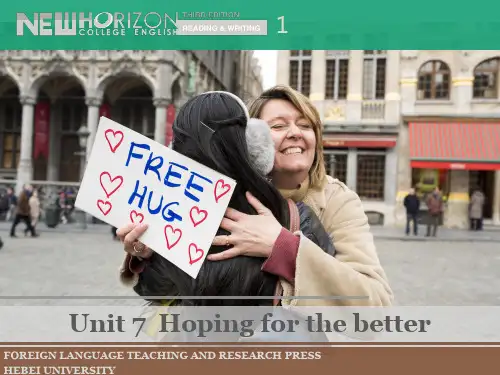
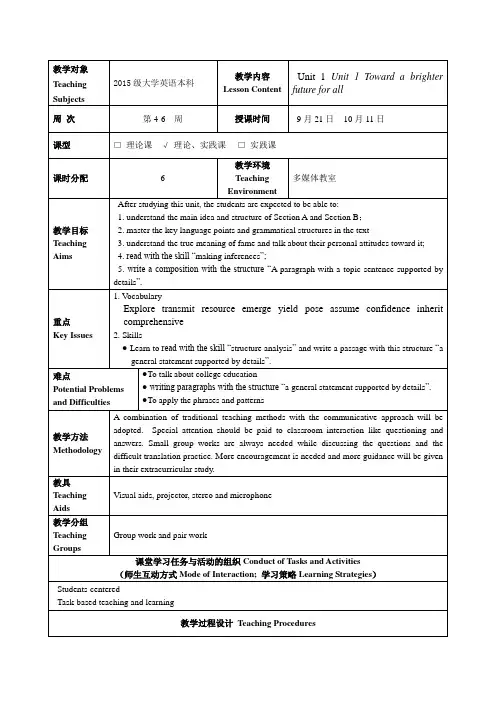
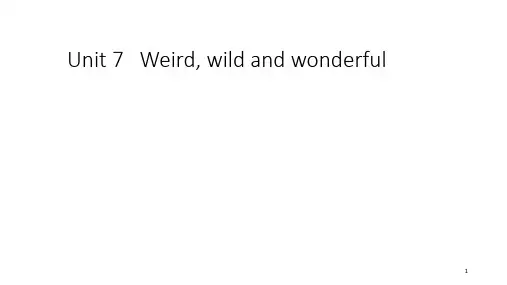
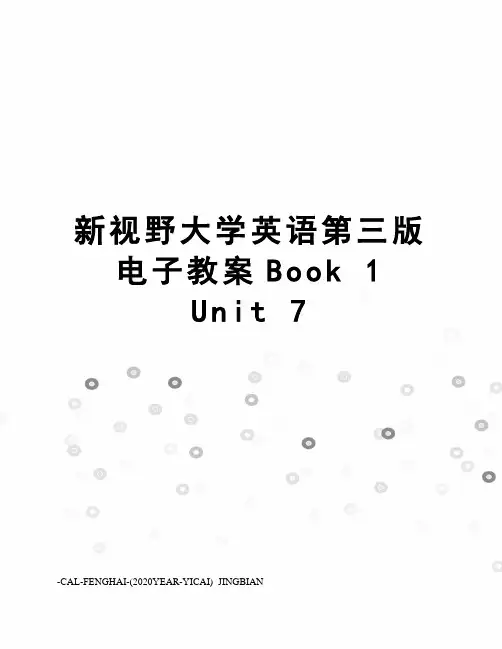
新视野大学英语第三版电子教案B o o k1U n i t7-CAL-FENGHAI-(2020YEAR-YICAI)_JINGBIANUnit 7Hoping for the betterUnderstanding and LearningOverviewThis unit discusses the issue of ethics and etiquette, and the seriousness of the issue. Seemingly, newspapers and TV news are telling us that some virtues are vanishing, honesty is going out of style, especially in the academic community, and people are ruder and more insensitive to others in many aspects. Is honesty really out of dateWhat rude behavior do people have? What forms of dishonesty exist on campusIs the phenomenon on the rise What other ethical and etiquette problems are there on and off campusText A shows how honesty is not valued as much as before across all layers of society. There are also different kinds of dishonest behaviors in school, for example, cheating and plagiarism. Students should realize those acts are totally wrong and unethical and they should not do so.Text B discusses various forms of poor etiquette and the reasons behind them. It also calls on us to practice kindness and strive for a better, brighter world for us all.Class activities can be designed to make students review cheating and rude behaviors on and off campus. The teacher may ask students to reflect on whether they have ever engaged in cheating or rude behaviors. Class discussion about bad behaviors and role-playing are recommended.Before reading Text A, ask students to list dishonest phenomena on campus, and comment on the causes and consequences of each phenomenon. Second, ask students to explore the reasons why cheating is common at college. Third, ask students to discuss some well-known scandals in academia. Finally, let them think about what teachers and students can do respectively to improve the situation.Before reading Text B, students can enumerate the rude deeds that they have observed. Then they may discuss possible causes and severe consequences for suchdeeds. Finally, students should try to provide solutions to today’s etiquette problems. As suggested in the Unit project, ask students to write short plays about rude behaviors and do a role-play.Section AWhen honesty disappearsBackground information1.Abraham LincolnAbraham Lincoln (1809-1865) was the 16th president of the United States from 1861 to 1865. He led the country through the American Civil War, preserving the Union, ending slavery, and promoting economic and financial development.Brought up in a poor family on a farm in Kentucky, Lincoln was mostly self-educated. Though without a formal education, his speaking skills and practice in debates won him national recognition. He was elected the US president in 1860.The Civil War began in April 1861when the Southern states declared to withdraw from the Union. In 1863, Lincoln issued the Emancipation Proclamation (《解放宣言》) and the 13th Amendment to the US Constitution that declared all slaves free men. In 1864, Lincoln was re-elected president for a second term.On April 14, 1865 at Ford’s Theatre in Washington, D.C., Lincoln was shot and killed by John Wilkes Booth, who was a stage actor and strongly opposed the abolition of slavery in the United States.Among American heroes, Lincoln continues to have a unique appeal for his fellow countrymen and also for people of other lands. Lincoln has been consistently regarded as one of the greatest US presidents. The Lincoln Memorial in Washington, D.C., was dedicated to him on May 30, 1922.Detailed study of the text1. As numerous accounts of cheating, lying, and fraud crowd our newspaper pages and TV news, it seems that honesty is a rapidly vanishing value. (Para.1)Meaning: From our newspapers and TV news, we read countless reports about people cheating, lying, and deceiving. Honesty as a valuable merit seems to be disappearing quickly.★fraud: n. [C, U] the crime of deceiving people in order to gain sth. such as money or goods 欺诈;诈骗They said that it was the temptation of money that led them to commit the fraud. 他们说正是受到金钱的诱惑他们才去行骗的。
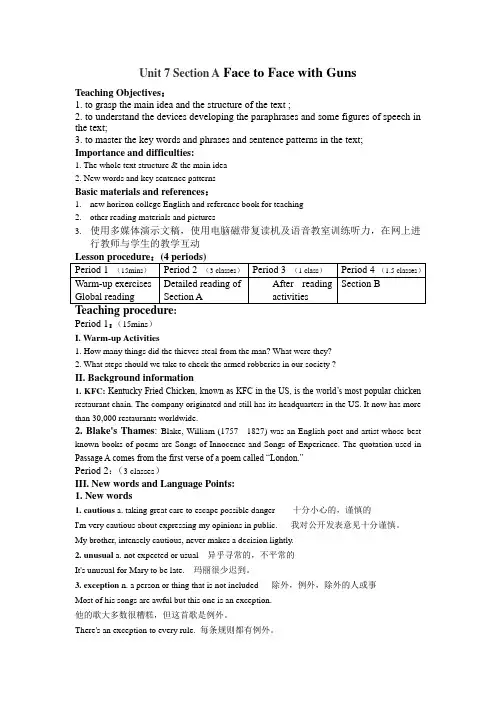
Unit 7 Section A Face to Face with GunsTeaching Objectives:1. to grasp the main idea and the structure of the text ;2. to understand the devices developing the paraphrases and some figures of speech in the text;3. to master the key words and phrases and sentence patterns in the text; Importance and difficulties:1. The whole text structure & the main idea2. New words and key sentence patternsBasic materials and references:1.new horizon college English and reference book for teaching2.other reading materials and pictures3.使用多媒体演示文稿,使用电脑磁带复读机及语音教室训练听力,在网上进行教师与学生的教学互动Teaching procedure:Period 1:(15mins)I. Warm-up Activities1. How many things did the thieves steal from the man? What were they?2. What steps should we take to check the armed robberies in our society ?II. Background information1. KFC: Kentucky Fried Chicken, known as KFC in the US, is the world’s most popular chicken restaurant chain. The company originated and still has its headquarters in the US. It now has more than 30,000 restaurants worldwide.2. Blake's Thames: Blake, William (1757 - 1827) was an English poet and artist whose best known books of poems are Songs of Innocence and Songs of Experience. The quotation used in Passage A comes from the first verse of a poem called “London.”Period 2:(3 classes)III. New words and Language Points:1. New words1. cautious a. taking great care to escape possible danger 十分小心的,谨慎的I'm very cautious about expressing my opinions in public. 我对公开发表意见十分谨慎。

Unit 1 Book OneSection A: Toward a brighter future for all Teaching Objectives:To know the meaning and usage of some important words, phrases and patterns To study Passage A and understand the main idea of the textTo understand the structure of the text and the devices for developing itTo talk about college educationTeaching Procedures:Pre-reading ActivitiesStep 1. GreetingsGreet the whole class warmly.Step 2. Lead-in and preparation for readingLet them talk to each other about the following questions:1. What is the ideal university like in your eyes?2. What are your expectations of your college life?3. What advice did your parents give you before you left for college?Step 3. Fast readingAsk the Students to read the passage as quickly as they can and then answer the questions on the screen. Let them get the main idea of each paragraph and make clear about the text structure.Text structure: ( structured writing ) The passage can be divided into 3 parts.Part1 (para.1-3) Opening part of the welcome speechPart 2 (para.4-7) Making the best of what you have.Challenging yourself.Facing new experiences.Opportunities and responsibilities.Part 3 (Para.8) Concluding remarks of the welcome speech.Purpose: Improve the students’ reading and writing ability and understand the general idea of each paragraph.Method: Read the text individually and talk in groups; Use task-based language teaching method, reading approach, communicative approach and total physicalresponse method.Step 4. Preparation for details of the text on the screenStudents are required to look at the Words and Phrases on the screen and give a brief presentation in class.Words and Phrases:Purpose: Train the Students’ ability of unde rstanding and using foreign language.Method:Talk in groups, Use task-based language teaching method, communicative approach and total physical response method.1. (Para.1)pledge to do sth. 作保证,承诺China and the United states pledge to boost cooperation and exchange to ensure a better future for China-US ties.中美政府承诺将加强合作与交流以确保两国关系的未来更加美好。
Xingtai PoIytechn i c Co11ege教案课程名称新视野大学英语I学时2序号1授课班级见附录日期参考说明任课教师见附录课题Unit8Friendship across gender and border(读写教程)教学目标能力目标:To comprehend the differences between men's friendship and women's.了解男性之间的友谊和女性之间友谊的区别。
To learn to accept and respect different kinds of friendships in different cultures with an open mind.用开放的心态学会接受和尊重不同文化中各类友谊形式。
应用性知识目标:To listen and get the key words of the listening material.听听力材料,并抓关键词,理解听力内容。
To get the ability of expressing oneself by using comparison and contrast pattern.能够运用对比和类比陈述自己观点。
To learn to use metaphors to make one's statements vivid.学会运用比喻等手法使陈述形象化。
训练项目(任务)Develop the listening and speaking skills:work in pairs and discuss 听力和口语技能训练教学媒体准备新视野读写教程1光盘新视野读写教程1—unit8课件第1页(共3页)教案教学过程教学活动步骤及时间安排:◊Review and question:dictate the key words and expressions in unit7(10 min)复习提问O Lead-in and listening training:What's friendship?Is there any difference between men's friendship and women's(10min)导入与听力◊ Overview of the text and text structure(30min)课文概述及结构分析◊ New words(30min)词汇◊ Exercises and conclusion(20min)课内练习及总结第2页教案教学过程板书设计:Text Structure课文结构Part I(Paragraph1):It introduces the author's different pictures of his female friends and male friends.Part II(Paragraph2-4):It provides two examples to illustrate how differently the author communicates with his male and female friends.Part III(Paragraph5-6):It discusses about gender differences in friendship and their causes.Language points语言点In...terms:used to show what aspect of a subjectIn comparison:talking about the ways in which two things are differentMake up for:do sth that corrects a bad situationOn a mission:performing a service or carry on an activityIn a...light:from a...aspectLook sb in the eye:look directly at sb when you are speaking to themTo sb's relief:with a feeling of comfort after fright,worry or pain作业:Finish exercises on P213and P216.完成语言点练习板块课后总结第3页Xingtai PoIytechn i c Co11ege教案课程名称新视野大学英语I学时2序号2授课班级见附录日期参考说明任课教师见附录课题Unit8Friendship across gender and border(读写教程)教学目标能力目标:Develop the language skills:the suffix-ly and-or.语言技巧:后缀J y和-" Learn the writing skills of contrast写作技巧:对比应用性知识目标:Master the different forms of suffixes:-ly and-or掌握后缀和-or Learn the writing skills of contrast写作技巧:对比.训练项目(任务)Develop the writing skills of contrast on page218写作技巧训练:对比. Develop the translation skill:translate a paragraph of time order.翻译技巧训练教学媒体准备新视野读写教程1光盘新视野读写教程1—unit8课件第1页(共3页)教案教学过程教学活动步骤及时间安排:◊Review activity:retell the main idea of text A(5min)复习◊Word-building:the suffixes of-ly and-or构词法◊ Language focus(20min)词汇练习◊Translation skills practice(25min)翻译技巧训练◊Writing skills practice(30min)写作技巧训练◊ Self-assessment(10min)自我评测第2页教案教学过程板书设计:Word-building:the suffixes of-ly and-orNoun+ly一adjectiveAdjective+ly一adverbVerb+or一nounTranslation skills and practiceTranslate the following paragraphsThe United Nations(English一Chinese)中国外交政策(Chinese—English)Writing skills and practice Topic!Topic sentence!Details of contrast!Summary or conclusion作业:Preview Section B.预习Section B课后总结第3页Xingtai PoIytechn i c Co11ege教案课程名称新视野大学英语I学时2序号3授课班级见附录日期参考说明任课教师见附录课题Unit8Friendship across gender and border(读写教程)教学目标能力目标:Set an open mind to the outside world.开放的心态Reading skills:grasp the main idea1翔读技巧:抓主题句应用性知识目标:Master the key language points in the text;掌握关键语言/也Master the reading skill.掌握阅读技巧训练项目(任务)Develop the reading skill:grasp the main idea 阅读技巧训练教学媒体准备新视野读写教程1光盘新视野读写教程1—unit8课件第1页(共3页)教案教学活动步骤及时间安排:◊Review activity:words dictation of Section A(10min)复习教学◊ Pre-reading activity:Pick out the main idea of each paragraph(10min)®读准备◊ Overview of Text B and text structure(10min)课文概述及结构分析◊Text reading(20min)课文阅读◊Text study(30min)课文讲解过程◊Exercises(20min)课文大意总结及复述◊Exercises(15min)课内练习第2页教案板书设计:Reading skills:grasp the main idea1.What is the subject of the paragraph?2.What is the purpose of discussing the subject?Is the purpose to inform,explain,discuss,define,defend or criticize the subject?3.What idea is the author trying to convey about the subject?State the main idea in each paragraph of Text B教学Para1:Para2:过程Para3:Para4:Para5:Para6:作业:Finish the reading comprehension P227.完成阅读练习板块Finish the language focus and structure P228-229.完成词汇、结构练习板块课后总结第3页Xingtai PoIytechn i c Co11ege教案课程名称新视野大学英语I学时2序号4授课班级见附录日期参考说明任课教师见附录课题Unit8Friendship across gender and border(读写教程)教学目标能力目标:Develop the language skills:collocation语言技巧应用性知识目标:Master the key language points in the text;掌握关键语言/也Grasp the collocation about the word aa friendship,\掌握“friendship"的搭配训练项目(任务)Unit project:Conduct a debate on cross-gender friendship课堂讨论教学媒体准备新视野大学英语I光盘新视野大学英语I-unit8课件第1页(共3页)教案教学活动步骤及时间安排:◊Review activity:review the key word and expressions in Text B(10min)复习提问◊Language focus and sentence structure(40min)词汇练习◊Collocation skills practice(30min)搭配技巧训练◊Group debate on cross-gender friendship(10min)课堂口语训|练教学◊Self-assessment(5min)自我评测J过程◊Summary(5min)小结第2页教案教学过程板书设计:Unit project―Cross-gender friendship is possible or notStep1:In-class debate:support or oppose the idea.Step2:Do research and collect supporting materials(at least4items)for your idea after class.Step3:State your ideas in the next class.作业:Review the whole book and prepare for the final exam.复习,准备考试。
教 案案New Horizon College English 新视野大学英语读写教程(一)教研室: 教师姓名: 课程名称课程名称授课专业和班级 授课内容 Unit 7 Women Women at at the Management Level授课学时 6 教学目的 The teaching objective of this unit is to help students:grasp the main idea and structure of the text;2. To understand the structure of 2. To understand the structure of ““A general statement supported by example[s]example[s]”;”;3. To write 3. To write ““A general statement supported by example[s]A general statement supported by example[s]”” essays;4. To master the key language points and grammatical structures in the text.5. To conduct a series of reading, listening, speaking and writing activities related to the theme of the text.教学重点 1. Text structure analysis2. Language points:Key words and expressions: administrative,?attorney,?accommodation,?segment,?be disposed?to?do?sth., on?both?counts, feel?at?ease?with?sb, make?a?concession / concessions?to, come?down?to,?take?exception?to?sth.,?burst?into,3. Writing skills: a general statement supported by example[s] 教学方法 1. Communicative approaches;2. Task-based teaching method;3. Audio-lingual method.教学过程 1. Warm-up Activities2. Text Structure Analysis3. Detailed Study of the Text4. Grammar and exercises5. Writing and reading skills practice作业 Homework:1. Recite the appointed paragraph.2. Translate sentences and write a paragraph showing “a generalstatement supported by example[s]statement supported by example[s]””.辅助手段 Multimedia software 辅导答疑教学内容Ⅰ. Warm-up activities Step 1 GreetingsGreet the whole class as usual.Step 2. Review1. Ask students some questions to review the last lesson (show them on the screen screen)).2. Check the homeworkMethod: Talk in groups; Use task-based language teaching method, communicative approach, and audio-lingual method.Step 3. Lead-in and preparation for readingShow the Ss some pictures and let them talk to each other about the topic on the screen.1. What is career woman?2. Should women stay home or work outside? Why?3. What are the advantages and disadvantages for the career woman?Purpose: Arouse the students’ interest of study. Bring in new subject: Genetic EngineeringStep 4. Fast readingAsk the Ss to read the passage as quickly as they can and to answer the questions on thescreen. Let them get the main idea of each paragraph and make clear about the text structure. Ⅱ. Text Structure AnalysisPurpose : : Improve the students’ reading and writing ability and understand the Improve the students’ reading and writing ability and understand the general idea of each paragraph.Method : Read the text individually and talk in groups; Use task-based language teaching method, reading approach, communicative approach and total physical response methodPart I (paras. 1-2): Introduction (thesis statement) of the textPart II (paras. 3): How female bosses managePart III (paras. 4-5): How male and female bosses are different in working styles Part IV(paras. 6-8)?: Why male and female bosses manage differentlyPart V(paras. 9): Obstacles for female bossesPart VI(paras. 10): ConclusionⅢ. Detailed Studies of the TextWords and Phrases1. employeen.[C] sb. who is paid to work for sb. else 受雇者;雇员Knowing what an employer is looking for in a potential employee can help someone to prepare for an interview.了解雇主在寻找什么样的潜在雇员可以帮助人们准备面试。
新视野大学英语1第三版读写教程答案Unit 7Section ALanguage focusWords in use31 reveal2 implying3 accurate4 exaggerated5 eliminate6 facilitate7 frustrated8 appropriate9 conscious 10 launch Words building4Words learned New words formed-alcontinue continualemotional emotioinindustry industrialpart partial-encecorrespond correspondenceinnocence innocentpresent presenceoccur occurrenceintelligent intelligence-yworth worthyunite unityinquiry inquire51 correspondence2 continual3 partial4 emotion5 occurrences6 innocent7 worthy 8 industrial9 presence 10 inquire11 unity 12 intelligenceBanked cloze61 L2 M3 C4 E5 H6 G7 J8 I9 N 10 AExpressions in use71 not to mention2 turn in3 rip off4 cope with5 launched a campaign6 If this/that is the case7 be confined to8 descend intoStructured writing9My dorm is nice to live in. For example, it has a very convenient location. It is close to everything on campus. It only takes 5 minutes to walk to my classes, 8 minutes to the library, 15 minutes to the swimming poo l, and only 2 minutes to the cafeteria. What’s more, there are great facilities in the building. There is a laundry room, a gym, a TV room, and even an ATM machine. Most importantly, I like my roommates. We get along very well, and we have a lot of fun together. In one word, I lovemy dorm.Translation10在所有美国人的信念中,最基本、最强烈的信念可能就是崇尚个人自由。
Unit 7, Book OneSection A: When honesty disappears1.Teaching Objectives:To discuss some social phenomenon about dishonestyTo further understand the textTo apply the phrases and patternsTo master the paragraph writing skill2.Time Allotment:Section A (3 periods):1st---2nd period: Pre-reading activities ( theme-related questions for warming up;)While-reading activities (cultural notes; useful words and expressions;difficult sentences)3rd period: While-reading activities (text structure; main ideas)Post-reading activities (comprehension questions; exercises)Section B(1period):4th periods: Practice of the reading skill (reading for the key idea in a sentence);T checks on Ss’ home reading by asking questions based on the passage.T explains some difficult sentences3.Teaching Procedures:Pre-reading ActivitiesStep 1. GreetingsGreet the whole class warmly.Step 2. Lead-in and preparation for readingShow them some pictures on the screen, and ask them:1. What does each picture depict?2. What are the common problems these pictures expose?Step 3. Fast readingAsk the Students to read the passage as quickly as they can and then answer the questions on the screen. Let them get the main idea of each paragraph and make clear about the text structure.Text structure: ( structured writing ) The passage can be divided into 3 parts.Part1 (para.1)ProblemPart 2 (para.2-4) Causes and SolutionsPart 3 (Para.5-6)EvaluationPurpose: Improve the students’ reading and writing ability and understand the general idea of each paragraph.Method:Read the text individually and talk in groups; Use task-based language teaching method, reading approach, communicative approach and total physical response method.Step 4. Preparation for details of the text on the screenStudents are required to look at the Words and Phrases on the screen and give a brief presentation in class.Words and Phrases:Purpose: Train the Students’ ability of understanding and using foreign language.Method:Talk in groups, Use task-based language teaching method, communicative approach and total physical response method.1. (Para.1)not to mention sth. 更不用说某事了All they have to do is pressing a button, and they can see shows of every kind, not to mention the latest exciting football match.他们只需按一下开关就可以看到各种各样的文艺节目。
至于最近的激动人心的足球赛更是不在话下。
2. (Para.1)rip off 盗窃He was arrested by the police for ripping off a watch after he walked into the store.他被警察抓了,因为他走进商店后偷了一块手表。
3. (Para.2) exaggerate: v. make sth. seem better, larger, worse, etc. than it really is 夸大;夸张;言过其实Shelly admitted that she did sometimes exaggerate the difficulty of her job.谢莉承认,她有时候确实夸大了自己的工作难度。
4. (Para.4)cope with(成功地)处理To my delight, he was able to cope with the stress of his study.令我高兴的是,他能够处理学习的压力。
5. (Para.4)Launch / wage a campaign发起一场运动To improve the staff’s comprehensive quality, the company launched a massive educational campaign.为了提高员工的综合素质,该公司发起了一场大规模的教育运动。
6. (Para.4)plagiarism: n. [U] when sb. uses another person’s words, ideas, or work and pretends they are their own 剽窃;抄袭More than half of the teachers in the survey said they thought plagiarism from the Internet was a serious offense.7. (Para.4) all but: everything or everyone except sth. or sb. 除…外全部All but one of the passengers were killed in the accident. 除了一个乘客外,其他人都在这起事故中丧生。
8. (Para.4) reveal:vt. Make known sth. that was previously secret or unknown 揭示;揭露;透露Many women do not want to reveal their true age in front of others. 很多女性不愿意在别人面前透露自己的真实年龄。
9. (Para.6)be confined to sth. 局限于···For the young, the hunger for knowledge is strong, and it is not confined to any time or place.年轻人对知识的渴望是非常强烈的,并不受任何时间或地域的限制。
10. (Para.6)descend into …陷入···状况They have taken effective measures so as to prevent the city from descending into chaos and bloodshed.他们采取了有效措施,阻止了整个城市陷入混乱和流血。
Step 5: While-reading ActivitiesLanguage Points:1. As numerous accounts of cheating, lying, and fraud crowd our newspaper pages and TV news, it seems that honesty is a rapidly vanishing value. (Para. 1)Meaning: From our newspapers and TV news, we read countless reports about people cheating, lying, and deceiving. Honesty as a valuable merit seems to be disappearing quickly.2. But are these reports truly accurate or do they exaggerate the situation? (Para. 2)Meaning: But are these reports correct and exact or do they make the situation look worse than it really is?3. If this is indeed the case, it’s deeply troubling as today’s students are tomorrow’s leaders! (Para.2)Meaning: If such a situation does exist, it is very worrying because today’s students will become leaders in the future!4. Modern students who want to fake a term paper don’t have to browse long. (Para.3) Meaning: Nowadays, students don’t need to spend a long time “stealing” online papers and ideas to be used in their own term paper.5. Long ago, all American schoolchildren knew the historical story of how Abraham Lincoln walked five miles to return a penny he had overcharged a customer. (Para. 5)Meaning: According to historical records, Abraham Lincoln walked five miles to return a penny he had overcharged a customer. The story with its moral virtue has been passed on from generation to generation. The author uses this story to show what he is to convey in this article.Step 6: Typical patterns:Purpose:Further understand the text (Train further reading ability)to find out some difficult sentences and details of the text.Method:Read the text together; Use task-based language teaching method, reading approach, communicative approach, grammar-translation approach and total physical responsemethod.Typical patterns:1. Travelers ripped off so many towels last year that it cost a major hotel chain $3 million to replace them. Especially troubling are the reports that dishonesty is increasing amongst student populations around the world.去年一年,一家大型连锁酒店的大量毛巾被游客偷走,酒店因此花费了300万美元来添置新毛巾。